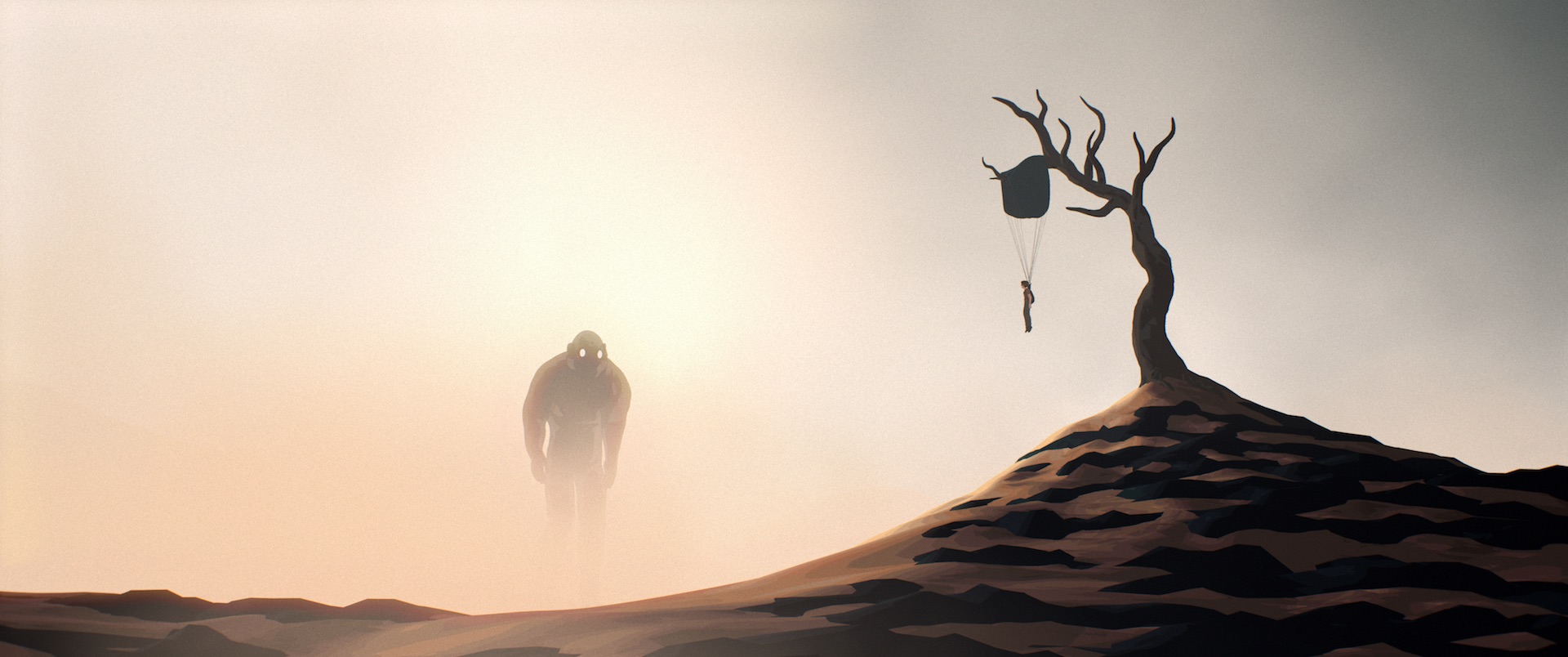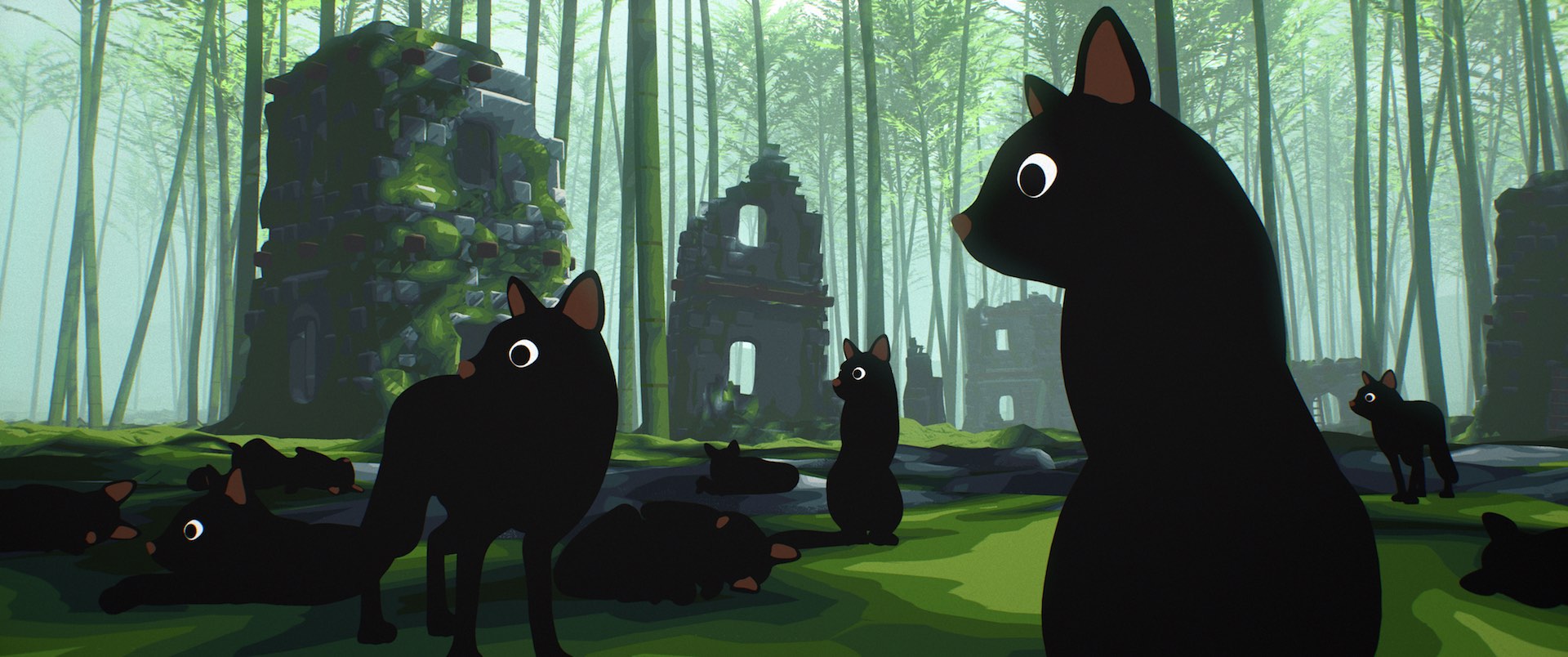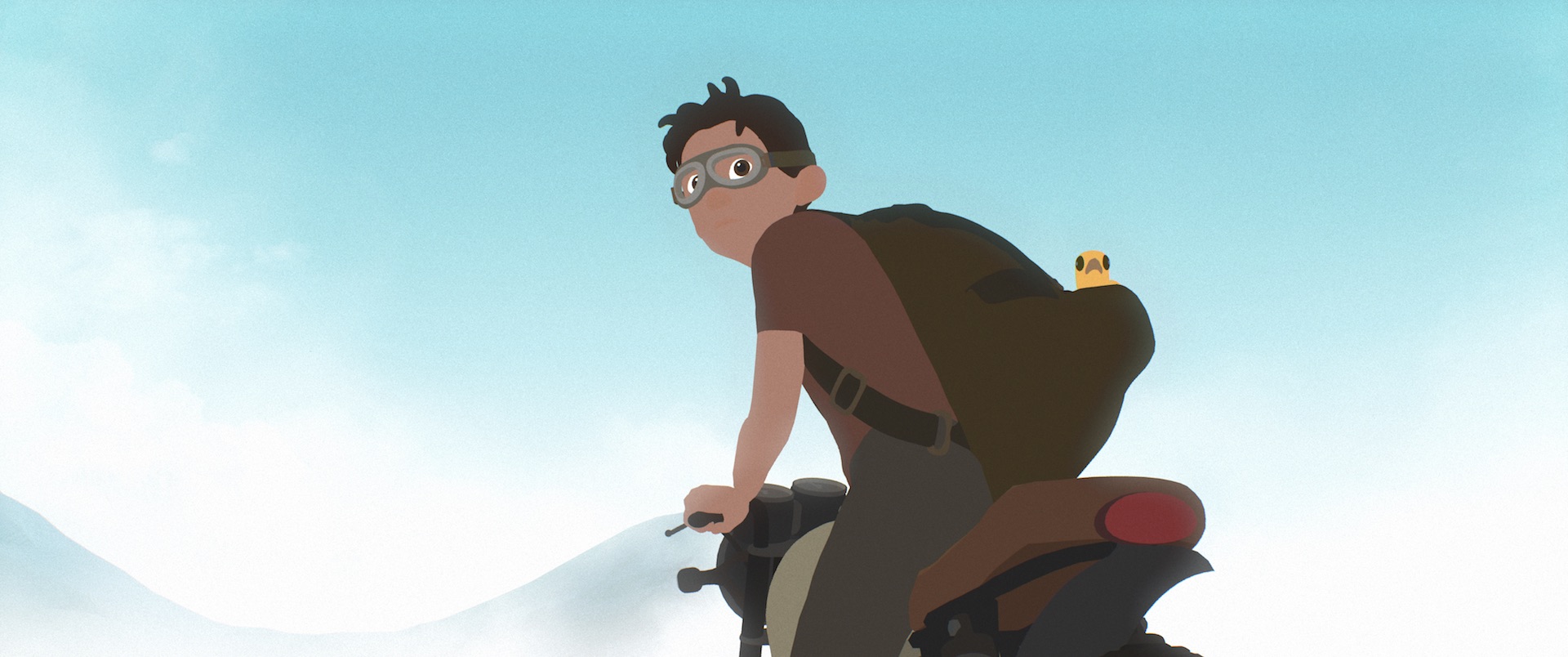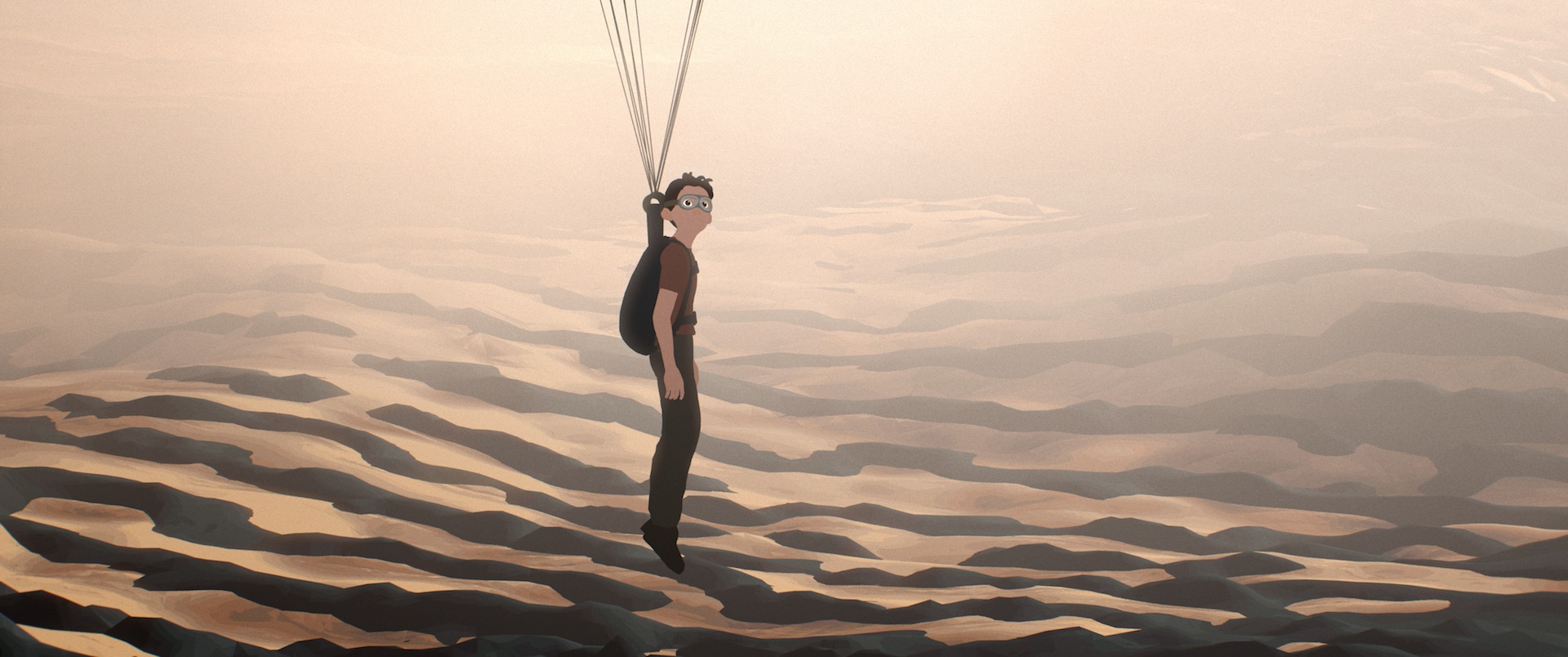It’s always exciting for us at Short of the Week to see a previously featured filmmaker move from making short films, to making features. We’re always eager to hear (and share) their story and for Latvian animator Gints Zilbalodis, this journey was certainly a unique one. A self-taught animator, with a history of creating distinct shorts (Inaudible, Priorities), his debut feature Away was not only created using short film funding, but was a one-man production with the filmmaker taking on every role himself. Zilbalodis joins us to discuss his unusual approach to financing his film, why he animates on his own and what we can expect from him in the future:
We obviously became aware of your work through your short films and we’ve been following your career for a while, was your plan to always move towards making a feature film?
I didn’t really plan that much into the future, but I always wanted to make a feature. When I started making Away, to make the transition easier, I split up the feature in four chapters so it was easier to structure the story and also to fund the film. I thought no one would really give me money to do a feature on my own, because I didn’t have that much experience before and making a whole feature on your own isn’t really done that often.
So I split it up into chapters. I’d always planned it to be a feature, but I also planned for each of the chapters to have a mini story arc so that each of the chapters would have a bit of a different atmosphere, a bit of a different pace.
I planned out the whole story, and then I focused on small parts so it was easier. It was more manageable, actually. I think, if I had the whole film to consider all the time, it would be a bit too overwhelming, just the amount of work to consider. If I was focusing on smaller parts, it was easier that way.

With that in mind, did your previous experience of working on short film help when it came to the feature?
Sure. I kind of consider myself to be self-taught mostly and I kind of learned filmmaking while making those short films. When I made the shorts, I thought that my story structure is more suited for the feature films. Sometimes in those shorts, it felt like I didn’t have enough time and I wanted to spend more time with the characters, develop them more, and to go a bit slower.
“At least I would have maybe one chapter or two chapters which I could distribute as short films”
Once you had the idea of making a feature, how did you go about making that possible? For a lot of people, it would seem like making a feature on their own is an impossible task. How did you start the process rolling?
When I decided to split the feature into four chapters, I thought that if it doesn’t work out and I maybe only get to do one chapter, at least I’ll have this as a safety blanket. It’s not like I’ve wasted years and have nothing to show. If I would have stopped in the middle, at least I would have maybe one chapter or two chapters which I could distribute as short films.
Actually, the whole process was pretty smooth. There weren’t that many major setbacks. I planned the story around things that are easy to do, that don’t take too much time to animate so that I wouldn’t spend 10 years making this film. It only took three and a half.
That’s why I had to do everything myself. If I would have hired some other people, they really wouldn’t know what is easy to animate and what is not. I really considered all of those things in advance. There aren’t that many characters. There aren’t that many crowd scenes.

There’s one scene with kind of a crowd, but I also planned that to be easy to do. We have this scene with lots of cats. First, I thought that each of the cats would have a different design and maybe a different personality. That would really make it much, much harder to animate. Then I thought it would maybe make more sense, even for the story, that the cats are kind of identical, and I would just take one cat and copy and paste it many times.
“If you go through a traditional way of making a feature, you can lose some of that creativity”
So it was all of these different tricks that allowed me to do this feature. I guess, sometimes, if you go through a traditional way of making a feature, you can lose some of that creativity. I’m afraid of that. I haven’t really worked in a large team, but if you go through all these traditional processes of writing a script and doing storyboards and doing everything like you’re supposed to do, I guess it’s a more predictable way of making films.
Because I did my film in such a different, unplanned way, it allowed me to experiment more. I didn’t really have a script, and I didn’t have a storyboard for the film. It allowed me to improvise more. Working with a large team, it would be more difficult to improvise.
It’s interesting you mention that, I was reading on Cartoon Brew about how you went into the production with no real script or storyboards. So what kind of pre-production did you do if any?
It’s hard to divide the pre-production, production, and post-production for this film because they all kind of happened at the same time. I kept changing things all the way until the end.
I created the sets and the characters in 3D, and I would just animate the characters really roughly. I would then take virtual cameras in the 3D software, and I would look for different shots and different angles. Then I had all this footage I could choose from and I would edit it with sound effects and music.
Then, once I figured out the basic editing, I would go back and polish the animation and add more details in the background. It’s difficult to divide where the pre-production ends and where the production begins because I would work a bit on the animation and the camera and the lighting and the effects, so it was all happening at the same time.
I didn’t really have concept art. All the visual style and everything was discovered in while I was modeling and animating.

How do you find this approach? Do you find it freeing, or at times can it be restrictive? Did it make you nervous going into your film with no real plan of where it was going, or were you really excited by the process?
I haven’t really done a film in a traditional way, with very precise script and storyboards. I’ve always done something like this.
I guess it’s easier for me because I don’t really have an official beginning date where I’m going into production and I feel all this pressure. I trick myself into making these films. I begin experimenting and it doesn’t feel like I’m actually making the film. I’m just playing around and trying different things. I keep doing this for a while, and eventually I have a film. I feel like it’s less pressure.
When you were going through this process of shaping your narrative on the fly, were there any points when you were making it and you were unsure of where the narrative was going? Did you hit any kind of sticking points with it, or was it always actually quite an organic process?
It was always kind of organic. I planned the narrative to be as simple as possible, so the character motivations and the goals and the conflict are very clearly defined and I wouldn’t get lost on the way.
“I was afraid that I would maybe stray too far from the main narrative.”
Maybe the first half is a bit more traditional in terms of the narrative. After the midpoint, it gets maybe a bit less traditional. Then, I would maybe question myself a bit and I was afraid that I would maybe stray too far from the main narrative.
Production-wise, you did everything yourself. That’s animation, the music, the whole production was a one-man team. With this approach to filmmaking, did you reach a point where you felt it was too much for one person?
Not really. I don’t think I would do it differently if I had to do it again, because I really didn’t have a choice. I didn’t have a budget to hire anyone else. When I decided to do everything myself, I thought it would be a great way to learn all the different aspects of filmmaking.
Now that I’ve done it, I can really communicate with sound designers, editors, compositors, and everyone. I now understand each of the jobs better.
The difficult part of making Away was probably just the pressure. I didn’t have anyone else I could ask for help. If I messed up, I had to fix everything myself. So, just the pressure of working alone on such a long project for months, years, that was difficult.
Is this the way you plan to continue working in the future, or do you plan to maybe try taking a different path and going for a more traditional approach?
With my next feature, Flow, at first while I’m finding the story and figuring out the art style, I’m going to work in a similar way, while I’m still by myself.
Eventually, I would like to have some other people to help me. For that, I think I will need to adapt my style into a more traditional way of working. If you have a team, you need to get everyone on the same page. It’s still a bit scary for me to change approach, because I would really have to rethink my whole process from the ground up. I would maybe need to find someone who would help me write the script.
It’s still a bit early. I’m going to develop Flow, for about a year by myself. After I figure out the basic structure of the story, I can start looking for some other people to help. I’ll try to do a different approach next time.
With this in mind, from looking at your experience with Away, is there anything from your production that you’re eager to repeat or any mistakes you’re keen to avoid?
I learnt a lot. When I was making it, I thought it was really hard, and I was sure I would take a break after finishing it. Then, when it was completed, with all this fresh knowledge I was really eager to do my next film. I think I can make it better.
Firstly, I’m going to approach Flow like a feature from the start. I’m not going to split it up in chapters, like I did with Away. I’m going to really try to focus on making the whole thing more consistent. I’ll try to structure the story so that it’s really building up to the ending.
I might start from the end this time. With Away, I started with the first chapter, and then I did the second, third, and fourth. When I started, I hadn’t really figured out the ending. This time, I think I’ll start from the ending and work backwards, so that the ending is really the culmination of everything in the story.
“I think the next film would improve if I have better people working on it”
Also, I want to work with other people this time. I want to work with people who are better than me at all these different things. I think I can do all these different jobs fine, but I’m not very good at any of them. I can do animation, and I can do music and editing, but I think there are other people who are better than me. I think the next film would improve if I have better people working on it.
How did you go about finding funding for Away? Can we talk a little bit about how you got the money for it?
There are two grant programs in Latvia that fund films. The main one is National Film Center, which has a lot more money for films. The other one is the State Culture Capital Foundation, which is not really for films, they’re more for arts projects. They have less money, but I found that it was simpler to fund the film from them because they really didn’t have any questions or notes. They gave me complete creative freedom. So most of the budget was from them.
As I didn’t have a screenplay or storyboards, it was difficult to get the funding. You really need some kind of a proof that you really know what you’re doing. That’s why I went to the State Culture Capital Foundation because they really didn’t ask that many questions.
“The budget was really, really small. Even for Latvian standards, it was really small”
As I mentioned earlier, I funded the film as four short films, as I thought people would trust me more to do these short films rather than a feature.
The budget was really, really small. Even for Latvian standards, it was really small. It was smaller than some short films made here. As I did everything myself, I didn’t have a studio to rent, I didn’t have a crew to hire, so it was fine.
Next time, if I need to work with a team, I would need to find a producer who could find a bigger budget.

So when you applied for funding, were you applying for funding for a short film or were you applying for a feature? Did your funders know that the idea was always to make a feature?
When I funded the first chapter, I said that I’m going to do it as a short film because, as I said, I didn’t know if it would work out or not. I didn’t want to promise that I would make a feature and then not deliver.
After I made the first chapter, I said that this is part of a longer project, but I didn’t say exactly how many chapters it would be. When I funded the third chapter, that’s when I said “this is going to be a feature”. Now that half of it was already made, I thought it would really help fund the rest of the film, because it was already halfway finished.
How has their reaction been to the feature? Has there been a positive reaction from your funders, considering the initial money came for a short film?
I don’t get much feedback from the funders, as I said, they don’t really ask many questions. They don’t give me many notes, but what I have received has been very positive.
How about Flow? Are you funding that the same way?
I just got some money to begin developing it. It’s a really small amount, but after I figure out the story, I’m going to look for producers, maybe in Latvia or maybe from other countries. I don’t know yet.
I’m going to need a bigger budget. I can produce it if I’m the only person that’s working on it, there’s not much paperwork, but if I have a crew, I couldn’t really produce myself. There’s a lot of red tape then.
Away has been touring festivals, so how’s the festival experience been so far? We know you won the award at Annecy, but has the film been well received by audiences?
It’s been good so far. We got the award in Annecy, which was amazing. I think it will help me a lot in getting Away seen and also to fund Flow.
“It’s nice to travel and to meet other filmmakers. I’m really looking forward to going to all the festivals”
Zagreb, Annecy and Shanghai were the first three, and now there’s actually more festivals that have selected it, but haven’t announced it yet. I’m going to be traveling a lot this year. I think it’s great to get out after making a film on your own for years and being basically at home most of the time. It’s nice to travel and to meet other filmmakers. I’m really looking forward to going to all the festivals.
Where do you stand with distribution for Away? Obviously, there was that article being shared around Twitter a bit that made it sound like it had been picked up by Netflix. That obviously wasn’t the case?
No. That wasn’t true.
But you are looking for distribution? Do you have anything lined up?
I’m not really handling the distribution myself. After Annecy, I was contacted by this sales agency called Cinema Management Group. They’re handling all the distribution. They’ve already found distributors in Poland, Portugal, and Middle East, and maybe one other territory, but I’m not sure if I can tell yet.
“I really hope that it gets to be shown in theaters, because the film is dialogue-free and it’s all told through visuals and sound”
I think, after Annecy, we stand a better chance of getting it seen. It’s probably not going to be a really big release. This film is not very mainstream. Hopefully it will be seen in some theaters. I really hope that it gets to be shown in theaters, because the film is dialogue-free and it’s all told through visuals and sound. I hope people get to see it in cinemas.
Once I know more about distribution, I’ll let people know on my Twitter.
If things had gone different and you hadn’t won the award at Annecy and Cinema Management Group weren’t involved, would you have thought about self-distribution? You did everything else yourself, why not distribution?
I probably would’ve done it myself if things wouldn’t have worked out the way they did, but I don’t know how exactly that would have gone, because I’m not very good at all that. I think I probably would’ve just released it online for free because I think without any marketing, no one would pay for it if they hadn’t heard about it.
Luckily, now I think it will be easier.
Final question. We’ve already talked about Flow quite a bit. Just can you let us know where you are in terms of production with that?
Flow is my next feature film. It’s based on one of my first short films called Aqua. It’s about this cat who’s afraid of water, who wakes up to find the whole world is flooded. He has to learn to swim and to overcome his fears. It’s another film without dialogue.
I finished Away in January, and pretty much right after completing it, I started making Flow. I really didn’t want to get any freelance work, I wanted to make my own films all the time, and I had to prepare something for the next grant contest here in Latvia.
So I made that teaser before I had anything else. Before I had the script or any concept art. The teaser was also a way for me to learn a new software. I’m going to do Flow in software called Blender. I was going through all the different aspects of production in that teaser. It was kind of a way to learn Blender.
Right now, I’m still developing the story. I’m making some character models, some tests for effects. It’s all very loose, but I’ve kind of slowed down now with Away being selected in festivals. I’m spending more and more time answering emails and traveling. So maybe the development of Flow will be a bit slower than I expected, but hopefully I can maybe finish it in three or four years if it goes as smoothly as Away.
 Rob Munday
Rob Munday